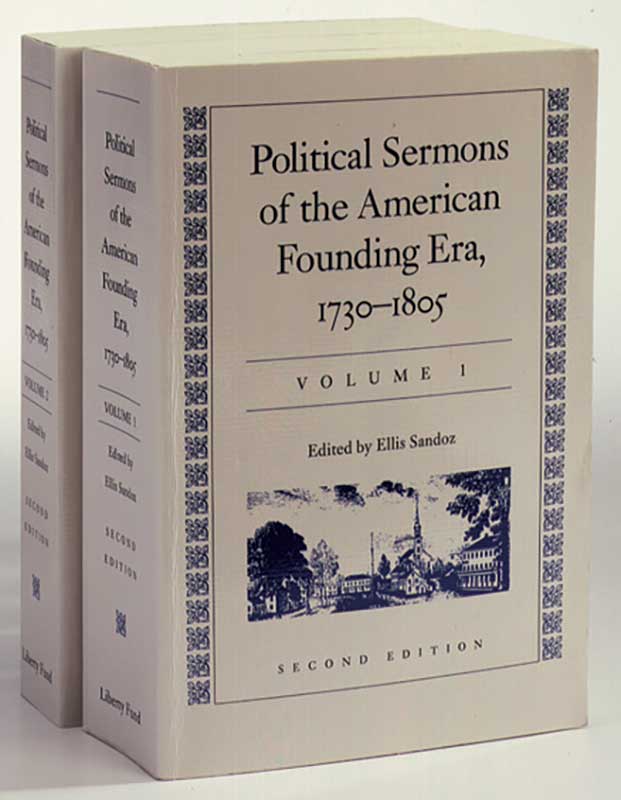Political Thought
-
The Logic of Liberty
by Michael Polanyi
/ Learn MoreA chemist and member of a family renowned for its learning in several disciplines, Michael Polanyi experienced first-hand the horrors of totalitarian government and worldwide war. He argued that centrally planned organizations—or governments—based solely on the methods of science threaten to foreclose a full human knowledge of the mysteries of existence and therefore pose a direct threat not only to…
-
The Man Versus the State
by Herbert Spencer
/ Learn MoreSpencer develops various specific disastrous ramifications of the wholesale substitution of the principle of compulsory cooperation—the statist principle—for the individualist principle of voluntary cooperation. His theme is that “there is in society . . . that beautiful self-adjusting principle which will keep all its elements in equilibrium. . . . The attempt to regulate all the actions of a community…
-
The Moral Foundation of Democracy
by John H. Hallowell
/ Learn MoreWith The Moral Foundation of Democracy, John H. Hallowell makes a significant argument in favor of the importance of moral values in the orderly functioning of modern democracies. Hallowell argues that developments in recent democratic thought have eroded the very “faith” upon which democracy rests, namely, that man is a reasonable, moral, and spiritual actor. He sharply criticizes positivist thought…
-
The Morals of Markets and Related Essays
by H. B. Acton
/ Learn MoreAlthough the market economy is not as unpopular now as when Acton wrote The Morals of Markets, the morality of buying and selling has long bothered man’s conscience. Defenses of capitalism often establish its efficiency or rely on a “that is the way human nature is anyway” argument. This book asserts that a free market is a necessary condition for…
-
My Thoughts
by Charles-Louis de Secondat Montesquieu
/ Learn MoreMy Thoughts provides a unique window into the mind of one of the undisputed pioneers of modern thought, the author of the 1748 classic, The Spirit of the Laws. From the publication in 1721 of his first masterpiece, Persian Letters, until his death in 1755, Montesquieu maintained notebooks in which he wrote and dictated ideas on a wide variety of…
-
On History and Other Essays
by Michael Oakeshott
/ Learn MoreIn five essays, including three on historiography, one of the greatest minds in English political thought in the twentieth century explores themes central to the human experience: the nature of history, the rule of law, and the quest for power that is intrinsic to the human condition. Michael Oakeshott believed, as Timothy Fuller observes, that “the historian’s effort to understand…
-
On Liberty, Society, and Politics
by William Graham Sumner
/ Learn MoreWilliam Graham Sumner is the “forgotten man” of American intellectual history. Too often dismissed or only superficially understood, his interpretations are now attracting closer scrutiny and appreciation. He is remembered chiefly as one of the founding fathers of sociology. Sumner’s analysis of the relation between the individual and society is deeper and more sophisticated than is commonly thought. For students…
-
On Power
by Bertrand de Jouvenel
/ Learn MoreDocumenting the process by which government and controlling majorities have grown increasingly powerful and tyrannical, Bertrand de Jouvenel demonstrates how democracies have failed to limit the powers of government. Jouvenel traces this development to the days of royal absolutism, which established large administrative bureaucracies and thus laid the foundation of the modern omnipotent state. Bertrand de Jouvenel was an author…
-
The Origin and Principles of the American Revolution, Compared with the Origin and Principles of the French Revolution
by Friedrich Gentz
/ Learn MoreThe Origin and Principles of the American Revolution is perhaps one of the most important books written on the American Revolution by a European author. It is an original study of the subject by a conservative, objective German observer who acknowledges the legitimacy of the American Revolution, but also asserts at the same time that it was not a revolution…
-
The Pacificus-Helvidius Debates of 1793–1794
by Alexander Hamilton and James Madison
/ Learn MoreThe Pacificus-Helvidius Debates of 1793–1794 matched Hamilton and Madison in the first chapter of an enduring discussion about the proper roles of executive and legislative branches in the conduct of American foreign policy. Ignited by President Washington’s Neutrality Proclamation of 1793, which annulled the eleventh article of America’s treaty with France of 1778, the debate addressed whether Washington had the…
-
Politica
by Johannes Althusius
/ Learn MoreDrawing deeply from Aristotle and biblical teaching, Politica presents a unique vision of the commonwealth as a harmonious ordering of natural associations. According to Althusius, the purpose of the state is to protect and encourage social life. The family is the most natural of human associations, and all other unions derive from it. Power and authority properly grow from more…
-
Political Sermons of the American Founding Era: 1730–1805
by Ellis Sandoz
/ Learn MoreThe early political culture of the American republic was so deeply influenced by the religious consciousness of the New England preachers that it was often through the political sermon that the political rhetoric of the period was formed, refined, and transmitted. Political sermons such as the fifty-five collected in this work are unique to America, in both kind and significance.
35% OFF YOUR ENTIRE BOOK PURCHASE
With promo code:
SPRING2024
Expires June 30, 2024












